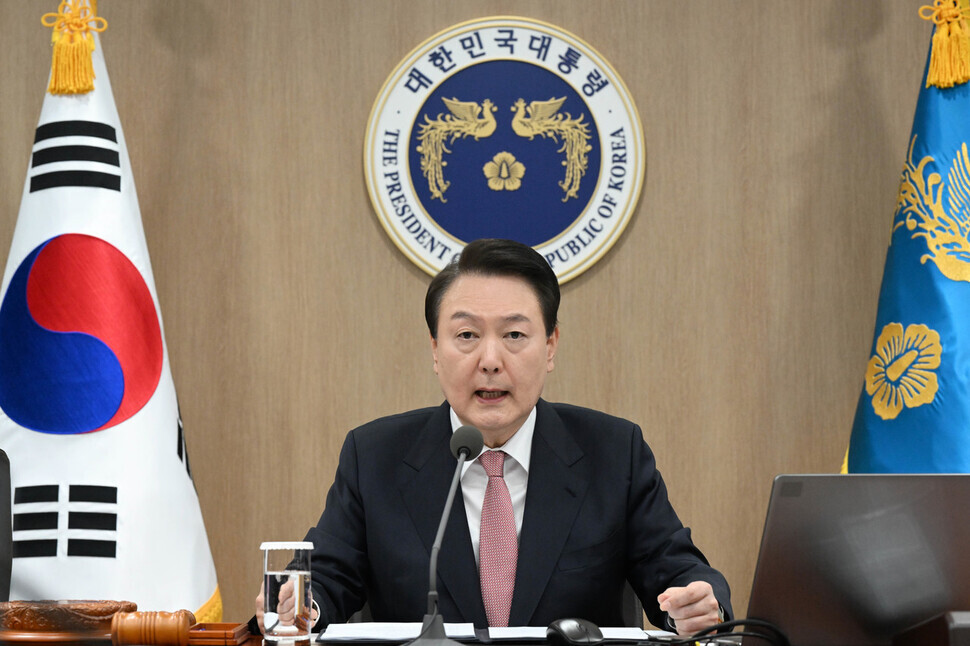hankyoreh
Links to other country sites 다른 나라 사이트 링크
Yoon deflects criticism of Tokyo summit as politically motivated

On Tuesday, President Yoon Suk-yeol stated that “we should acknowledge and remember the past but should not let that hold us back,” in reference to the South Korea-Japan summit held in Tokyo on March 16. The president argued that the bilateral relationship between South Korea and Japan “should move forward, beyond the past.”
With many criticizing the government’s behavior as pushing for “one-sided” and “giveaway” diplomacy, Yoon appealed directly to South Korean citizens by claiming that “the normalization of bilateral relations between South Korea and Japan will inspire a new sense of pride in our people.”
However, the top opposition Democratic Party of Korea has characterized the diplomatic talks as “humiliating” and said that it would look into launching a parliamentary investigation into the summit outcomes.
In his opening remarks at a televised Cabinet meeting on Tuesday, Yoon said, “The relationship between South Korea and Japan is not a zero-sum relationship where one side’s loss is the other’s gain. It can and should be a win-win relationship where we work together to gain more together.” Yoon’s unusually long speech ran for more than 20 minutes.
Yoon invoked previous administrations as the backdrop justifying his visit.
“The previous government left the bilateral relationship in a quagmire,” he said, “and I felt that I would be neglecting my responsibilities as president if I tried to incite hostile nationalism and anti-Japan sentiment to utilize it in domestic politics in this severe political climate.”
He furthermore added, “There are forces in our society that are trying to make political gains by advocating exclusionary nationalism and spreading anti-Japanese sentiments.”
The president took aim at critics of the summit’s outcomes, accusing them of having “political intentions.”
“If South Korea removes obstacles preemptively, Japan will surely respond,” Yoon stated, saying that he planned to instruct the minister of trade, industry and energy to initiate the necessary legal procedures to restore Japan to Korea’s whitelist.
The Japanese government excluded South Korean exports from its whitelist in 2018 in response to the South Korean Supreme Court’s ruling on compensation for victims of forced labor during the Japanese colonial era, a move that was mirrored by the South Korean government at the time. This means that, once again, it is the South Korean government that is taking the initiative to normalize relations.
As a follow-up to the meeting, the Ministry of Foreign Affairs also notified in writing that it would withdraw two notices related to the General Security of Military Information Agreement, or GSOMIA, completing the “full normalization” process.
Park Hong-keun, floor leader of the Democratic Party, said at a meeting with fellow lawmakers, “We cannot tolerate this humiliating foreign diplomacy, which pales only to the Japan-Korea Treaty of 1905,” referring to the treaty that made Korea a protectorate of Japan. He added that the party would “put the will of the people into consideration and seriously consider launching a national investigation.”
The probe is expected to include the “third-party repayment” plan, which calls for a government-run South Korean foundation to pay compensation to victims of forced labor in the stead of the offending Japanese companies, as well as issues surrounding Dokdo, the comfort women settlement, and restrictions on imports of Fukushima seafood, which were reported to have been discussed during the summit.
By Kim Mi-na, staff reporter; Shim Wu-sam, staff reporter; Jung In-hwan, staff reporter
Please direct questions or comments to [english@hani.co.kr]

Editorial・opinion
![[Column] Season 2 of special prosecutor probe may be coming to Korea soon [Column] Season 2 of special prosecutor probe may be coming to Korea soon](https://flexible.img.hani.co.kr/flexible/normal/500/300/imgdb/original/2024/0426/3317141030699447.jpg) [Column] Season 2 of special prosecutor probe may be coming to Korea soon
[Column] Season 2 of special prosecutor probe may be coming to Korea soon![[Column] Park Geun-hye déjà vu in Yoon Suk-yeol [Column] Park Geun-hye déjà vu in Yoon Suk-yeol](https://flexible.img.hani.co.kr/flexible/normal/500/300/imgdb/original/2024/0424/651713945113788.jpg) [Column] Park Geun-hye déjà vu in Yoon Suk-yeol
[Column] Park Geun-hye déjà vu in Yoon Suk-yeol- [Editorial] New weight of N. Korea’s nuclear threats makes dialogue all the more urgent
- [Guest essay] The real reason Korea’s new right wants to dub Rhee a founding father
- [Column] ‘Choson’: Is it time we start referring to N. Korea in its own terms?
- [Editorial] Japan’s rewriting of history with Korea has gone too far
- [Column] The president’s questionable capacity for dialogue
- [Column] Are chaebol firms just pizza pies for families to divvy up as they please?
- [Column] Has Korea, too, crossed the Rubicon on China?
- [Correspondent’s column] In Japan’s alliance with US, echoes of its past alliances with UK
Most viewed articles
- 1[Column] Season 2 of special prosecutor probe may be coming to Korea soon
- 2‘We must say no’: Seoul defense chief on Korean, USFK involvement in hypothetical Taiwan crisis
- 3Is N. Korea threatening to test nukes in response to possible new US-led sanctions body?
- 4Division commander ordered troops to enter raging flood waters before Marine died, survivor says
- 5Is Japan about to snatch control of Line messenger from Korea’s Naver?
- 6No good, very bad game for Korea puts it out of Olympics for first time since 1988
- 7[Editorial] Korea’s surprise Q1 growth requires objective assessment, not blind fanfare
- 8Korea’s 1.3% growth in Q1 signals ‘textbook’ return to growth, says government
- 9N. Korean delegation’s trip to Iran shows how Pyongyang is leveraging ties with Moscow
- 10Amnesty notes ‘erosion’ of freedom of expression in Korea in annual human rights report